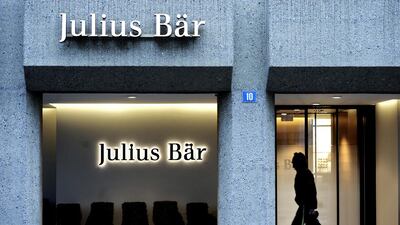The Swiss private bank Julius Baer expects to grow its business in the double digits annually over the next five years as Middle Eastern investors seek to diversify their investments in an environment of low oil prices, the lender’s executives said.
High Net Worth Individuals (HNWIs) in the region are seeking greater returns and are looking to funnel cash into international markets, according to Diego Würgler, head of investment solutions and advisory for the Middle East at Julius Baer.
“I think here you still have a lot of wealth of the clients that is not properly covered by the international banks,” said Mr Würgler. “Clients more and more now are considering also international diversification. Local clients here are a fan of everything which is called high yield. We find them generally above average in terms of return targets or below average in terms of risk aversion.”
He declined to give a figure for the bank’s Middle East assets. Globally the bank’s client assets grew 14 per cent to 396.4 billion Swiss francs last year (Dh1.49 trillion) compared to 2013.
Private wealth in the Middle East and Africa is forecast to grow at a compound annual rate of 6.5 per cent to reach US$7.2tn by the end of 2018, according to a Boston Consulting Group report from last year.
Regional private wealth grew 11.6 per cent in 2013 to reach $5.2tnon the back of high savings and strong GDP growth. Equities were the strongest contributor to wealth, in line with global trends.
Julius Baer is one of a number of Swiss institutions seeking to tap into the region’s growing wealth base. Pictet Asset Management, Credit Suisse and UBS all have offices in the region.
Julius Baer is advising its clients to invest in selective US, European and Japanese equities which could benefit from central bank bond-buying programmes.
“In the US we are buying growth companies, companies which are able to grow but are not heavily affected by the economic cycle and industrial production, like biotechs and health care,” said Christian Gattiker-Ericsson, chief strategist and head of research at Julius Baer. “All of those that are not really at much linked to the swings in the economy,”. “Those companies in historical terms are not that expensive.”
The US economy is expanding – at a rate a little above 2 per cent in the last quarter of 2014 – and growth in the 19-member euro zone is expected to pick up now that the European Central Bank’s €1.1 trillion (Dh4.33tn) quantitative easing initiative has begun.
The stimulus measures have helped to push down the euro against the US dollar, helping to make European exports cheaper.
“In Europe, we invest into very cyclical areas, industrial consumer discretionary stocks, which are heavily linked to an upturn in the economy and benefit via the export channel from a global recovery especially after the euro weakness,” said Mr Gattiker-Ericsson.
Julius Baer is also advising its clients to invest in fixed income in select emerging markets.
“What we generally advise our clients to avoid is more the high-yield segment within the fixed income market, and this is mostly because of the fact that the sector today is extremely expensive,” said Mr Würgler. “We now just think these kind of investors are not any more rewarded with the credit risk, which is quite a concrete risk, they are taking today.”
dalsaadi@thenational.ae
Follow The National's Business section on Twitter

